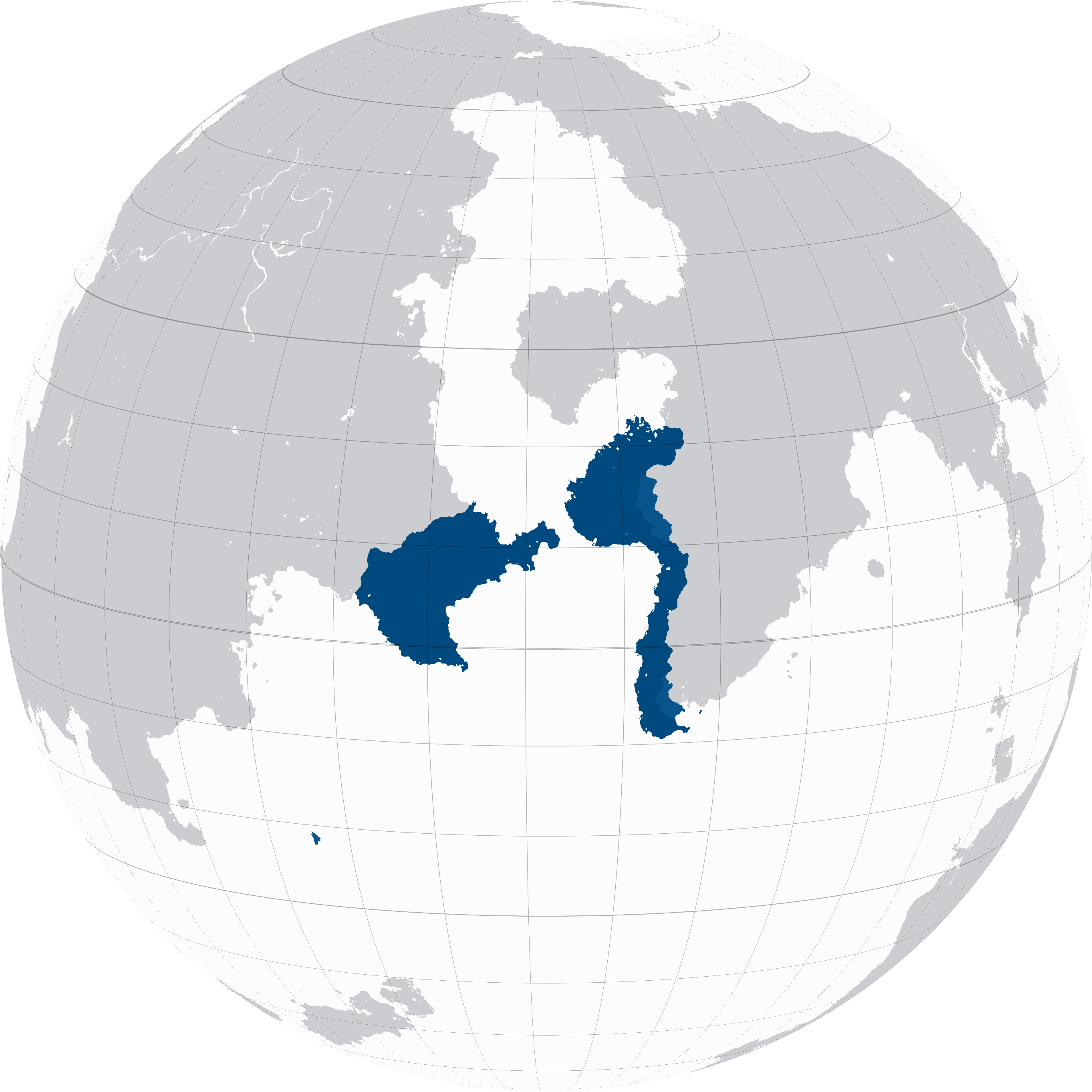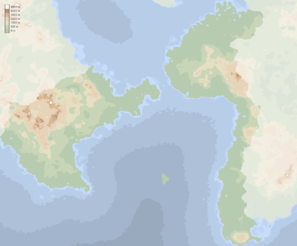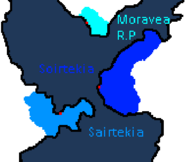Tekkia
|
Consolidated Tekkia
Teachta Comhdhlúite
|
|||||
|---|---|---|---|---|---|
 |
|||||
| Motto | "Aon Cheann Eile" (None Above Else) |
||||
| Common Name | Tekkia | ||||
| Anthem | "Ó Chósta go Cósta" | ||||
 |
|||||
| Consolidated Tekkia in 2099 | |||||
| Demonym | Tekkian | ||||
| Official languages | Parast, Tekkian | ||||
| Currency | Rút | ||||
| Politics | |||||
| Capital | Cath | ||||
| Government | Federated Parliamentary Republic | ||||
| Foundation | 2040 (Re-establish federation) 2029 (Current Constitution) 1999 (Collapse) 1977 (Second Federation) 1953 (Receded) 1947 (First Federation) 1814 (Republic established) 1410 (Ra'an Dynasty) |
||||
| Priomhaire | Unformed Government | ||||
| Followed by | Aontas | ||||
| Demography | |||||
| Ethnicities | 80% Aontan 13.1% Kostel 3.5% Iridian 0.8% Ravnian 1.6% Other |
||||
| Population | 13,252,926 | ||||
| Area | 41,122 km² | ||||
Tekkia (Aontan: Teachta [Ch:ach:ta]), also known as Consolidated Tekkia (Teachta Comhdhlúite), is a country located in south-west Kafrica and south-east Kolus. The country is externally bordered by Celrapan and Chosaint to the north, Granderia to the west, and The Three Grestins to the east. It is otherwise surrounded by ocean, with the Kolusian Sea to the north, Gulf of Iro to the south-west, and the Armando Sea to the east. It covers an area of 41,122 km² and has a population of more than 13.25 million, making it one of the more populous nations on Kerbin. The capital and largest city is Cath, which is situated on the eastern bank of the nations main strait. Other major cities are Samos and Vargo.
It is a semi-sovereign state as the primary component state of the Federation of Greater Aontas and a Federated Parliamentary Republic in itself. It is divided into fifteen provinces and three autonomous regions; Rhudbeal Island Authority among them.
The primary spoken language of Tekkia is Aontan which is spoken by 98% of the population. An additional 5% of the population speaks Parast, an officially accepted language in two provinces, with 3% of those being fluent in Aontan.
The country as it exists today was established following the 1814 Revolutions of Tekkia, when the preceeding Monarchist government was overthrown in place of a federated republic. The nations location on the mouth of the Kolusian Sea has meant that the area has been relatively prosperous, being connected to two of Kerbin's main continents and a keystone to international systems in the Sea. Tekkia has earned a reputation of being
| “ | not warlike enough to be Kolusian, not idle enough to be Caledon, and not cowardly enough to be Kafrican | ” |
| —Marie Tairvol | ||
Tekkia participated in the Industrial Revolution and its consequences and, during the 19th and 20th centuries, maintained possession of numerous overseas holdings first colonised by the preceding Kingdom. These holdings would slowly be given, willingly or unwillingly, to local governments in the decades leading up to the Great Decline.
Tekkia would be one of the few national governments to exist in continuity between the beginning and end of the Great Decline, however, the national ethos would undergo a notable change during this period. The government of Tekkia for the latter part of the 21st century would be one regarded as fearful of conflict and its potential hardships.
Tekkia is one of the 5 founding nations of the Kolusian Allied Treaty Organisation. They are also a member of the JF, World Assembly, and host the Capital of the Federation of Greater Aontas. Tekkia is a developed and spacefaring nation with active colonies on 4 bodies and is categorised as "very high" on the Kerman Development Index.
Etymology
The name Tekkia, a Kostel translation of Teachta derives its name from the informal name used in reference to the Personal Union in the leadup to the Revolutions of Tekkia in the late 16th and early 17th centuries. The term becoming later adopted by the revolutionary government to distance from the past and to engrain the new states decentralisation.
| “ | The Aontan Kingdom has become nothing more than a Deputy State(teachta-stáit) wherin none are willing to take responsiblity but glad to the spoils of their position | ” |
| —Finch Bell-Kerman, The Writings of Finch Bell 1798-1822 | ||
Geography
Tekkia is a transcontinental country bridging south-western Kafrica and south-eastern Kolus. Kolusian Tekkia, which covers xx% of the nation's territory, is seperated from Kafrican Tekkia by the Kering Strait. Kafrican Tekkia covers a further xx% of the nation's territory with the remaining x% comprised of Caledon Tekkia(Rhudbeal). Tekkia covers an area of 41,101 square kilometres, making it the 2nd largest country by area in Kafrica behind Solaria. The country is surrounded on most sides by seas: the Kolusian Sea to the north, the Gulf of Iro to the Kolusian west, and the Tekkian Sea to the south
Lying mostly between latitudes -15° and 20°N; Tekkia is divided into 6 geographical regions: Cabria, Tekkia Proper, Parp, Kulge, Sleibh, Insular.
- Kafrican; The Kafrican portion of Tekkia is located at the westernmost edge of South Kafrica and contains the first 3 of the listed regions.
- The uneven Cabrian terrain running along the Tekkian Sea resembles a long, narrow belt. This region comprises approximately one-sixth of Tekkia's total land area while containing one-quarter of its external boundaries, bordering Grestin.
- Kolusian; The Kolusian portion of Tekkia is located at the easternmost edge the Kulge Desert and contains the Kulge and Sleibh regions. These regions forms the border between Tekkia and its neighbours Chosaint and Granderia.
- Kulge terrain mostly consists of the two peninsulas of x and x, which consist of arid plains flanked by inland sleibh highlands and more temperate coasts.
- The Sleibh Highlands region has a mountainous landscape. Tekkia's highest point; mt Velm at 6,520 metres, is contained within these highlands
- Caledon; The Caledon portion of Tekkia is located on the northernmost island of the island chain; Rhudbeal. The island is more temperate and shares commonality with the rest of the island chain.
Climate
Most of Tekkia has a Tropical climate dominated by humid westerly winds. The east gets an average of 589 mm of precipitation per year; there is no consistent dry season. Winters are cool and summers tend to be warm.
The west has a much more dry climate where longer dry periods occur during summer seasons. The mountainous regions in the extreme north-west, to a lesser degree, some areas of the deep south have a mountain climate, with lower temperatures and more precipitation. The Sleibh mountain range acts as a shield, preventing rainfall reaching the south and east, causing large scale desertification.
Biodiversity
As of 2058 the majority of Tekkia is covered by either desert (34%), arable land (30.1%), or forest and woodland(13.4%), 11.8% is covered by settlements and streets.
The 2 national parks in Tekkia are the Black Krags National Park and East Mount National Park. Tekkia also houses several dozen nature parks. Tekkia's wildlife is typical of Kafrica. A native animal to the western hills are the small Floghs that consume the region's sparse vegetation while invasive Spider Cows have become a rapidly growing pest.
Politics
Government
Consolidated Tekkia is a Federal Parliamentary Republic operating under a framework laid out in the 2029 constitution known as the Dlíthe Bonn (Base Laws). Amendments require a referendum. The fundamental principles of the constitution, as expressed in the articles, guarantee kerman dignity, the separation of powers, the federal structure, and the rule of law.
The President is directly elected by the people on the basis of ranked voting every 8 years. They are not required to have a party but most often a candidate is backed by a Councilliary Party. The President can propose bills as well as being required to pass any bills put forward by the Federal Council.
The Federal council is a selection of elected individuals from across the Federation. Proportionately represented elections are held every 8 years. The Priomhaire themselves is chosen at the beginning of a term by the entire Council. The Council has the ability to remove them through a vote of no confidence and must have a successor prepared if so. The Priomhaire must have a seat in the Council. There was no Priomhaire in the period 2085 - 2094.
Since 2029 the council has been dominated by the two parties; Daontos and Saor Conhameide with Leath Nu gaining significant traction with the re-establishment of the federation. As of the 2102 elections Daontas has fallen to the wayside.
- Leath Nu, Favour expansion of the Federation but have waned in recent years due to a shortening list of targets. The party has begun campaigning on a platform of Kolusian Identity, garnering greater support in the Western States
- Daontas, The party have been doubling down in support of more centralization and lesser intervention abroad in light of the poor long term outcomes of actions in Spice and Blytheria.
- Saor conhameide, The party has supported national and individual independence placing associate well-being and freedom above the best interest of core Tekkia.
Subdivisions
Tekkia comprises eightteen provinces. Provinces are clustered into states known as Substates and are largely autonomous in regard to their internal organisation.
3 substates make up modern Tekkia. Cabria, Phoen Tekkia, and Soir Tekkia. Whereas the number of substates historically could reach over a dozen. An additional 8 provinces encompass federal associate states of Chosaint and Grestine.
For the purposes of voting Tekkia and it's associates are split into 155 districts of equivalent population, the majority of which are in the north-east regions.
Foreign Relations
Tekkia maintains relations with more than 100 nations.
Tekkia is a member of JoolFed and core of the Federation of Greater Aontas. It has played an influential role in Kafrica and the world since it's formation and has maintained intermittently strong relations with New Grestin 2040-2057, 2084-2132 with rapidly declining relations preceeding the collapse of Grestian powerbases. The nation was a founding member of the Kafrican Free Trade Area(KAFTA) and later the Kolusian Allied Treaty Organisation and World Assembly
Demographics
Languages
###
Education
###
Religion
###
Age
###
Military
The Federal Military is subdivided into two sections. Home Guard and Expeditionary.
The Home Guard is a reserve force consisting of enlisted civilians in the case of an invasion, it is primarily infantry with mothballed mechanized groups waiting for reactivation.
The Federal Expeditionary Force consists of the main Tekkian navy, air force, and army. It is a small but professional army under the direct authority of the minister for defence, the Force maintains peace and helps to resolve conflicts in surrounding nations. Notable deployments include Spice, Granderia, and The minor Baskay Bay.
In 2100, military spending was at €11 million, about 14% of the country's GDP According to FAASI, Tekkia was the forth largest exporter of major arms in the world from 2040 to 2050 prior to a ban on exports outside of allies.
Air Corp
The Federal Air Corp operates half a dozen different craft types at any one time, however the majority are produced by Cabrian Aeroworks. The Air Corp is the 2nd largest division of the FAF following the Army. Air Corp jurisdiction extends to LKO with Sabre type SSTOs patrol departure lanes.
Army
The Federal Army is the largest division of the armed forces, accounting for over 1/3 of total military spending. While most vehicles are produced by Corais Sfear reconnaissance and moving wing aircraft are purchased from differing companies. The Sfear contract is to expire in March 2100.
The Navy of Tekkia is the second smallest ahead of the Support Corp. They are tasked with patrolling fishing zones in the Great Kerbin Ocean, Kolusian Sea, and areas around Rhudbeal Island. They are secondarily tasked with the interception of unauthorized entries to the Kolusian Sea.
Support Corp
The smallest division of the FAF, the support corp is tasked with the relocation of personnel and strategic resources. They operate a number of regional airliners as well as heavy lift gear. All vehicles in the Support Corp are produced by Proole Air.
Orbcom
Orbital Command is the privately contracted military force operated by Sigma Technologies, tasked with the protection of Tekkian colonial holdings and the safe transit of citizens to their destination.
Economy
Tekkia's economy on a varies with each substate. On a federal level the government imposes maximum and minimum taxes to all substates taking the proceedings, dividing it according to population, and keeping a fraction for federal projects.
The service sector contributes approximately 62% of the total GDP, industry 35%, and agriculture 3%. The unemployment rate amounts to 4.3% in January 2075. Tekkia has one of the highest productivity levels in the world.
The common currency of Tekkia, Chosaint, and Granderia is the Rút.
Soir Tekkia was historically and remains the economic heart of Consolidated Tekkia. Centered around the political capital of Cath. The city of Vargo in the south is the fastest growing economy in the nation.
Taxation
###
Transport
With its position on the crossroads of Kolus and Kafrica, Tekkia is a transport hub for the continent. Like its neighbours in Southern Kafrica, Tekkia's eastern road network is among the densest in the world, though disconnected from the Central Sea motorway ring by the Kulge desert.
The largest Tekkian airports are Cath Airport and Vargo Airport, both hubs of Proole Airlines. Other airports include Chosaint, Bis, and Rhudbeal. Portfada is one of the largest container ports in the world.
A small orbital transport industry has its base in the western deserts, ferrying crew to construction and mooring facilities around Kerbin and Minmus.
Energy and Infrastructure
In 2094, energy sources were:
- fusion; 50.3%
- nuclear; 18.1%
- hydro-electric; 10%
- renewable sources; 21.6%
The country's household recycling rate sits at around 85%
Trade
###
Science
Tekkia is a global leader in science and technology as its achievements in the fields of science and technology have been significant. Research and development efforts form an integral part of the economy.
Space exploration forms a major part of that effort. The CSC (Clár Spás Cónaidhme) is the federally funded space agency of Tekkia. It has become largely neglected in the years since 2040, comprising only a small amount for communications and anomaly research.
There are a number of ongoing private initiatives such as colonization efforts on Ike, Minmus, and Duna, as well as cooperation with JoolFed.
History
The Aontan People
Geography bred the Aontas people.Ocean currents pushed them inwards to the Kolusian sea
Monarchy and Ra'an
Throughout most of it's history Tekkia was not a federation but a dual monarchy of Fhoen and Celeath. The two would remain separate dynasties. This agreement ended with the reign of king Ra'an the 3rd, a simultaneous heir to both thrones.
The Tekkian Acts of Union were decreed upon inauguration which would place both under a single throne based in Samos Due to the physical and cultural separation caused by the Kolusian sea, revolts became common as the power of the nation was concentrated in the western capital.
As kerbin's population expanded the west became unable to support the significant populations to match the east, making the prospect of rebellions and unrest a growing one. In an attempt to offset this balance a program of expansion and overseas colonisation was undertaken by the kingdom.
Growth
Shortly prior to the full subduction of the west the invention of gunpowder occurred, used early on for crude rockets the technology began to see use by the small kingdoms of kerbin to expand, the more wealthy of which having having greater chances. With Tekia on the choke point of a vital naval trade route favorable trade agreements and payments for protection of the opening allowed the kingdom to expand farther than ever reaching mountains and other powers on all sides and islands far aflung. This was the beginning of kerbin as we knew it.
During the Industrial Revolution
With the discovery of steam power progress for kerbalkind rapidly progressed. Within a generation the nations of Kerbin grew from trains to tanks as further mechanization enabled exponentially increasing progress. But with this technological change came societal. The kerbals had gained power and began to demand rule by the people. Some powers embraced this chance, willingly conceding authority. Others like the kin of ra'an centuries past sought to combat this change by force. Revolution had bred revolution of another sort and the old rule was forcefully removed in place of a republic. As the dust settled over the world the small world had become one of Great Kerbal Powers.
Expansion of the Republic
The power status of the world's nations pressed the fledgling republic to expand into other regions, as they brought more territory into the fold many were granted autonomy. Treposia, Rhudbealeach, and Soltem for notice because of their distanced nature. Eventually the country grew in size the fringe regions became harder to control giving way to independence movements. The need for a fully federalised state was seen. In the aftermath of the Second Krakenary war Tekia, along with recently liberated territories formed a decentralised federal republic. The first Tekkian Federation. These federal nations shared foreign policy and some federal laws but on a whole each state was free to make their own path. As years passed the federation continued to peacefully integrate nations up until the great war.
The Great War
The war saw the Federal Nations attacked on all fronts by aggressors seeking to expand their own power in a global game of one-upmanship but through unity, good will, and negotiating enemies into allies we persevered. In the aftermath of the great war the Tekkian Federation reached it's greatest extent. Freeing annexed nations of years past and providing them membership on their terms. The federation had been pushed into a superpower status.
The Great Decline
In the years following the conflict the remaining powers of kerbin remained on good terms. With no common threat the large nations began to fracture into smaller ones, the world became as divided as it was in years past. The federation splitting into sizable nations like The militant Svarskbarsk, Unstable Alber, or Tekia in chaos. Or smaller states like Nura, Egercia, and Lyn. Despite however divided the world was there was still peace.
Rebirth
Decades passed, the SMC spread into space and shrunk on kerbin and Zokesia disappeared from history altogether. Old hatreds rose up and once again kerbin was flung into war.
Notable Events
- Race into orbit (2040 - 2047)
- First Contact with Solaria (2040)
- The Baskay Conflicts(2040 - 2044)
- KAFTA foundation (2044)
- KATO foundation (2047)
- Invasion of Granderia and Operation Knife (2050)
- KATO-PAKT Cold War (2051 - 2057)
- Nua Program (2056)
- The Comer Crisis (2060)
- Tekkia and the Reciprocity Civil Wars (2069 - 2082)
- Dual Elections (2077)
- The Second Kroman Crusade (2077)
- The Great Kerbin War (2083)
- The World Assembly (2083 - 2093)
- Tekkian Involvement in Blyatnam (2084 - 2085)
- The Zokesian Blockade (2091)
- Formation of Kafraic Theas and the Fuma Contingency (2096)
- Propping up North Grestin (2095-2098)
- Establishment of Grestine (2099)
- Vuchalla Purchase (2100)
- 2102 Elections (2102)
- Formation of Greater Aontas (2105)
- Accession of Diosca (2111)
- The Three Grestins Period (2132-2149)
About The Flag
The central white column represents both the Aontas strait separating the East and west as well as the peace between the two. The left hand blue is representative of Sair Tekia and it's closeness to the deep ocean to the south while the lighter blue of the right represents Soir Tekia and the Kolusian sea. The two maintain a close colour palette to show the close cultural ties between the two nations.











